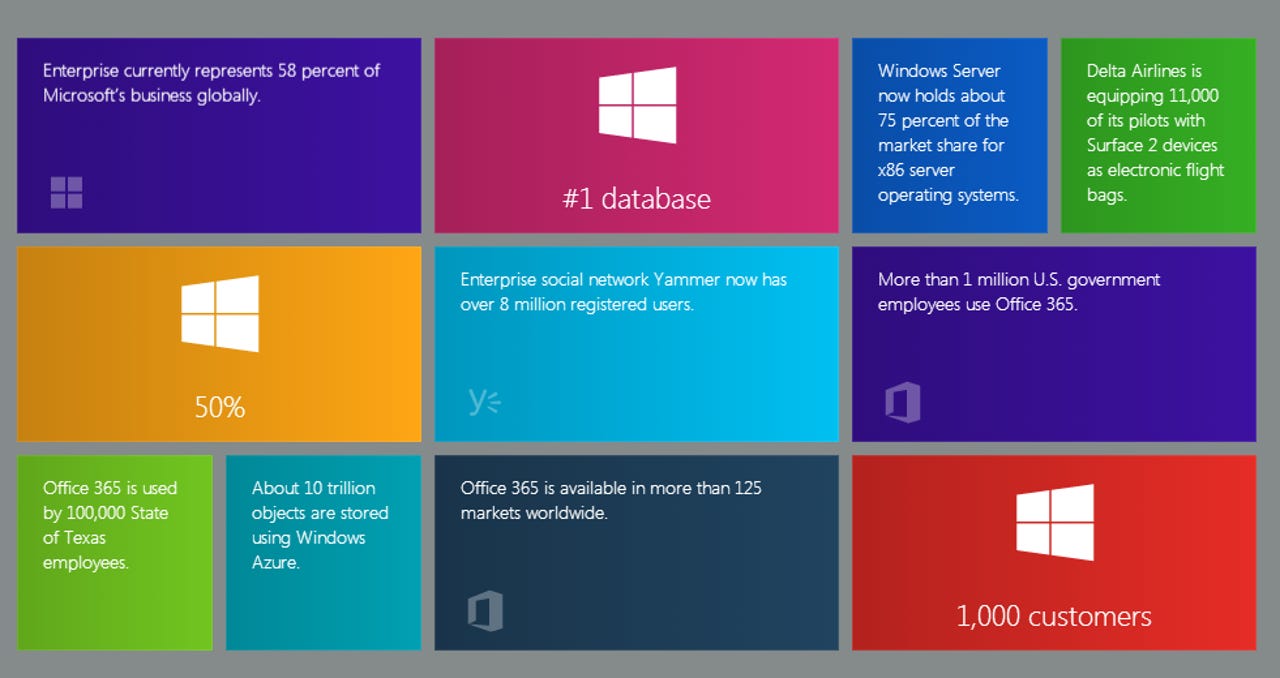Microsoft is still an enterprise software company (And that's ok.)

What is Microsoft these days?

Microsoft officials, first and foremost, want to position the company as a devices and services power house, or at least well on its way to becoming one.
The reality, as the company's Q2 FY 2014 earnings made plain is Microsoft is still a software company. And a primarily enterprise software company, at that.
There's nothing wrong or shameful about this fact. But it's not the message Microsoft wants to convey, given management is heavily focused on growing the company's consumer market share. Microsoft doesn't want to be IBM. But it's still a lot more like IBM than it's like Apple or Google.
Figuring out where Microsoft is making money is a bit tricker than it used to be. Gone are the familiar, old Windows/Office/Online/Entertainment/Server & Tools groupings us Microsoft watchers had come to know and sort of love. Microsoft made over its reporting categories a few months back.
New segmentation not withstanding, it's apparent that Microsoft's strong second fiscal quarter for fiscal 2014 was powered by enterprise software more than devices or services -- regardless of any headlines one might see to the contrary.
Using the new reporting structure, here were the top three segments, revenue-wise, for Microsoft in Q2 FY 2014:
1. Commercial licensing, meaning Windows Enterprise, Server Products, Office Business, Dynamics and Unified Communications: $10.9 billion
2. Devices and consumer licensing, meaning Windows OEM, Windows Phone, Office Consumer and IP licensing: $5.9 billion
3. Devices and consumer hardware, meaning Surface, Xbox/Xbox Live and other hardware: $4.7 billion
And here are the top three Microsoft business segments, as measured by gross margins, for Q2 FY 2014:
1. Commercial licensing (a k a the enterprise software mentioned above): $10.8 billion
2. Devices and consumer licensing (more software, including Windows, Windows Phone and Office client, as noted above): $5.0 billion
3. Commercial "other," meaning Enterprise Services, Office 365, Azure and Dynamics CRM Online: $415 million
Yes, it's still early days in Microsoft's transition to a devices and services company. But it's still worth noting what's missing from both the top revenue and top margin lists -- specifically, hardware (Surface, Xbox) and consumer services (Bing, MSN, Office 365 Home Premium).
While Microsoft shared specific unit and/or license numbers for several of its consumer offerings -- Xbox, Office 365 Home Premium -- as part of its latest quarterly earnings release, company officials were not willing to share sales figures for the company's less sexy and more enterprise-focused software products. There were no dollar or license breakouts for products like System Center, SQL Server, Visual Studio, Lync, Exchange, Windows Server, SharePoint Server and the like. Instead, Microsoft offered basically meaningless measurements, given there was no baseline, such as "double-digit growth" (System Center and SQL Server) and "seats more than doubling" (Office 365 commercial and Azure).
Xbox consoles sold well during the holiday, as did Office 365 Home Premium, which is Microsoft's subscription-based version of Office for consumers. Windows Phone revenues increased by $340 million, or 50 percent, in the quarter, according to Microsoft (though this total hides how much the company made from licensing the Windows Phone OS vs. how much it made by licensing mobile-phone patents).
But make no mistake: It's still Microsoft's enterprise software that powers Microsoft. Ten of the company's self-proclaimed 16 billion-dollar businesses were business-focused ones as of the last time Microsoft shared information on its billion-dollar business club. And five of the remaining six all had enterprise components. (The one exception is Xbox.)
Enterprise software is king at Microsoft. At least for now....